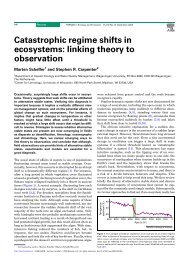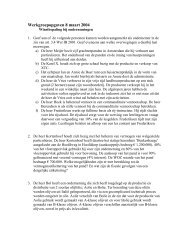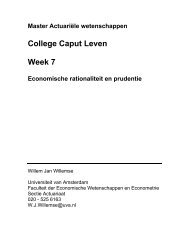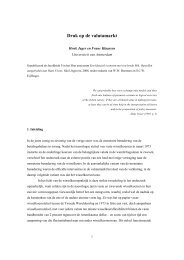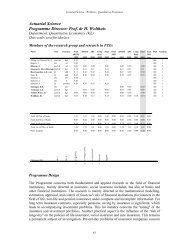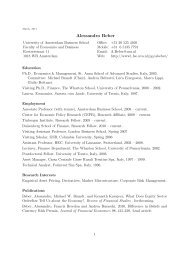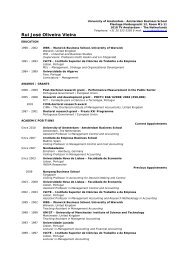A meta-analytically derived nomological network of procrastination
A meta-analytically derived nomological network of procrastination
A meta-analytically derived nomological network of procrastination
You also want an ePaper? Increase the reach of your titles
YUMPU automatically turns print PDFs into web optimized ePapers that Google loves.
1402 W. van Eerde / Personality and Individual Differences 35 (2003) 1401–1418<br />
1.1. Procrastination as a trait<br />
Procrastination has typically been defined as a trait or behavioural disposition to postpone or<br />
delay performing a task or making decisions (Milgram, Mey-Tal, & Levison, 1998). Defining<br />
<strong>procrastination</strong> is problematic in the sense that it is an intra-individual process that is regulated<br />
by internal norms <strong>of</strong> delay. To others, delay may or may not appear to be <strong>procrastination</strong> (cf. Milgram,<br />
Srol<strong>of</strong>f, & Rosenbaum, 1988), depending on their own norms and attributions. Delay can be<br />
purposely planned, and it can be a wise strategy. However, <strong>procrastination</strong> can be distinguished from<br />
planning because the delay is not purposely planned, but rather postponing the implementation <strong>of</strong><br />
what was planned. Everyone may procrastinate at some occasion, but the trait definition appears to<br />
indicate that the individual delays actions or decisions whether it is appropriate to a particular situation<br />
or not. Why would an individual have this tendency? It appears to be the inability to delay<br />
gratification, also called the lack <strong>of</strong> impulse control. Impulse control is the ability to give up shortterm<br />
outcomes—usually seen as more pleasant—for long-term outcomes. Mischel and colleagues<br />
(e.g. Mischel, Shoda, & Peake, 1988) showed the positive effects <strong>of</strong> impulse control over many years<br />
(for an example relating self-control to <strong>procrastination</strong> see also Ferrari & Emmons, 1995).<br />
In an historical overview <strong>of</strong> <strong>procrastination</strong> (Ferrari, Johnson, & McCown, 1995) it was noted<br />
that the Latin verb procrastinare, meaning ‘‘putting forward until tomorrow’’, did not have<br />
negative connotation until the mid-18th century, at the beginning <strong>of</strong> the Industrial Revolution.<br />
To this day, <strong>procrastination</strong> has moral connotations (Sabini & Silver, 1982);it implies not living<br />
up to others’ or one’s own obligations, which can lead to feelings <strong>of</strong> guilt. In general, it is seen as<br />
a dysfunctional habit, with psychological consequences such as experienced guilt or negative<br />
affective well-being, and a decrease in performance outcomes, and social consequences such as an<br />
image <strong>of</strong> undependability. This moral connotation may be part <strong>of</strong>, or may in fact be, the problem<br />
experienced. In other cultures, not as influenced by a protestant work ethic, characterized by a<br />
different pace <strong>of</strong> life (cf. Levine & Norenzayan, 1999), there may not be a problem. But in an<br />
achievement oriented society, where individuals are expected to meet obligations within a certain<br />
time span, <strong>procrastination</strong> may be a serious problem, as demonstrated by the number <strong>of</strong> books<br />
and programs related to help individuals to stop procrastinating, notably in the United States.<br />
1.2. Previous studies on <strong>procrastination</strong><br />
With the exception <strong>of</strong> a few studies, research on <strong>procrastination</strong> has been performed in these<br />
cultures that stress the undesirability <strong>of</strong> <strong>procrastination</strong>. Another limitation <strong>of</strong> most previous<br />
studies is that, due to the intra-individual nature <strong>of</strong> <strong>procrastination</strong>, it is measured through selfreports.<br />
Although reports from others could be used, assuming that others would know whether<br />
the behaviour was purposely delayed or not, this has not been done <strong>of</strong>ten. However, several<br />
validated self-report scales are in existence (see Ferrari et al., 1995, for an overview and items).<br />
Differences in operationalisation can be observed, with a focus on <strong>procrastination</strong> measured as<br />
postponing actions, i.e. behavioural <strong>procrastination</strong>, for example the General Procrastination<br />
Scale (Lay, 1986), a 20-item scale with items such as ‘‘I usually buy even an essential item at the<br />
last minute’’, or the Adult Inventory <strong>of</strong> Procrastination (McCown & Johnson, 1989 in Ferrari et<br />
al., 1995). Another scale emphasizes postponing decisions, i.e., decisional <strong>procrastination</strong>, as a<br />
subscale <strong>of</strong> decisions making styles (Mann et al., 1998), a 5-item subscale with items such as ‘‘I




